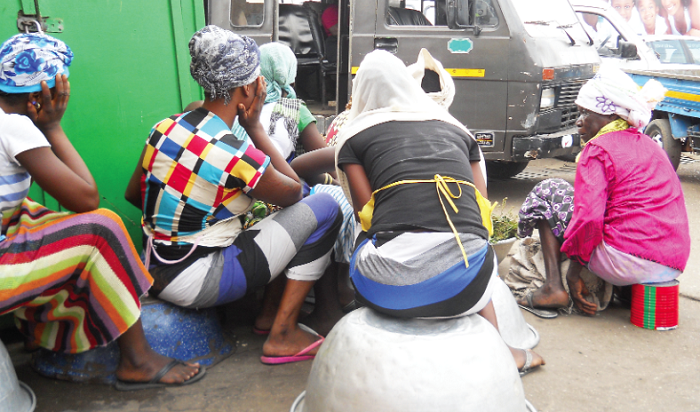Accra is fast becoming a home to young women who mostly migrate from the Frafra, Gonja, Kotokpoli, Dagomga, and Mamprusi ethnic groups located in the Northern parts of Ghana in search of work to survive, popularly known as Kayayei (Kayayo for singular).
While a few of the kayayei migrate from Togo, Niger, and Burkina Faso, most of them are between the ages of 10 and 40 and have limited or no formal education.
Due to this, they don’t have much knowledge in formal or white-collar jobs hence their involvement in domestic jobs which includes household services like babysitting, cleaning, cooking, washing clothes among others.
Various market places in Accra serve as a home to these Kayayei women as they take shelter and rest at the frontage of shops at night after roaming in the corners of markets during the day in search of domestic jobs to survive.
Speaking to Hamda Husaian a single mother of three who lost her husband four years ago she said “I have been working as a kayayo in Accra for over 5 years. Back in the village, the struggle to come to Accra to make ends meet is high.
Things became tough and tougher each day and as a single mother I had to pressurise myself to migrate down here in Accra and involve myself into the Kaya business,†she stressed.
According to her, irrespective of how hard she works, people still mistreat and underpay her-overlooking the fact that she needs to earn income to send some to her family back home.
Consequently, poverty has led her to settle in a slum area where accommodation is cheap.
“People know how hectic it is walking miles every day in the hot sun carrying loads yet, their action toward us is so inhumane,†she stressed.
A 26-year-old kayayo, Humu Hussani stated that regardless of how tirelessly she works, she still can’t afford to rent a place, though she has been in the hustle for over seven years.
She has just been able to acquire possessions like utensils and clothes in preparation towards marriage. “I sleep in front of shops and sometimes shop owners either deliberately close late because they don’t want me or any of my fellow kayayei to rest in front of their shops or they come early in the morning to chase us out.
“These shop owners have the perception that we are thieves and witches and that sleeping in front of their shops brings them bad lack,†she lamented.
Meanwhile, the government in the past has made efforts to support the health-related issues of kayayei which includes the National Health Insurance Scheme (NHIS) established in 2004 to provide affordable health care.
In May 2016, the Minister for Gender Children and Social Protection, Nana Oye Lithur ensured that over 1,000 Kayayei from Agbogbloshie and Mallam Atta markets in Accra were registered onto the National Health Insurance Scheme to help provide them access to basic healthcare services.
In the 2017 annual budget, the Minister of Finance, Ken Ofori-Atta exempted kawaii from paying market tolls to the various assemblies.
However, Kayayei appeals to all and sundry to respect their work, treat them better, and pay them handsomely.





